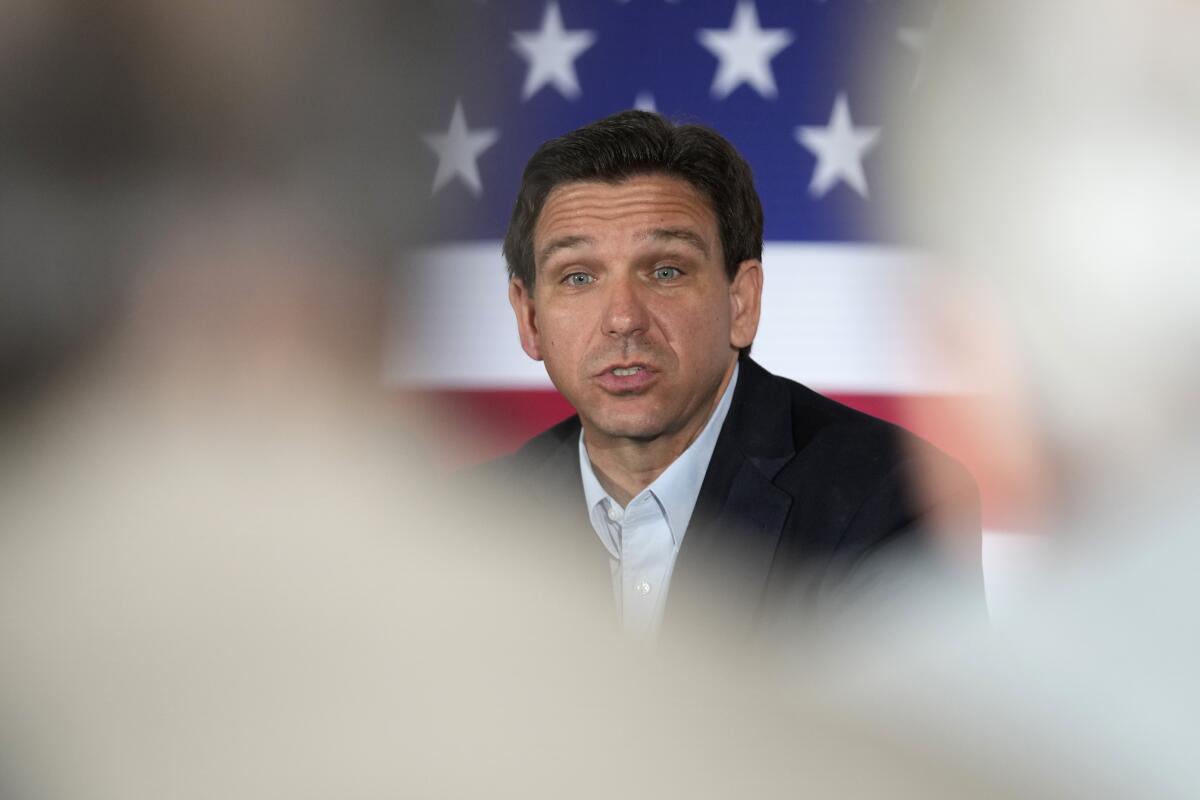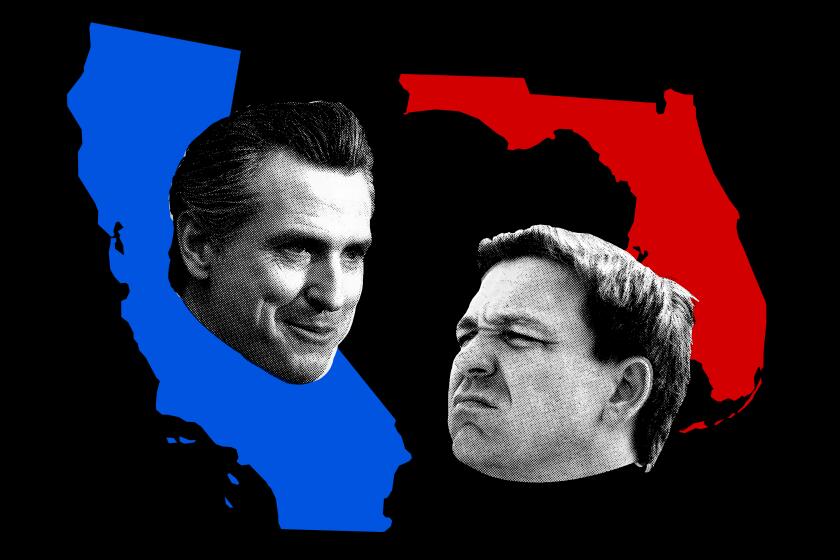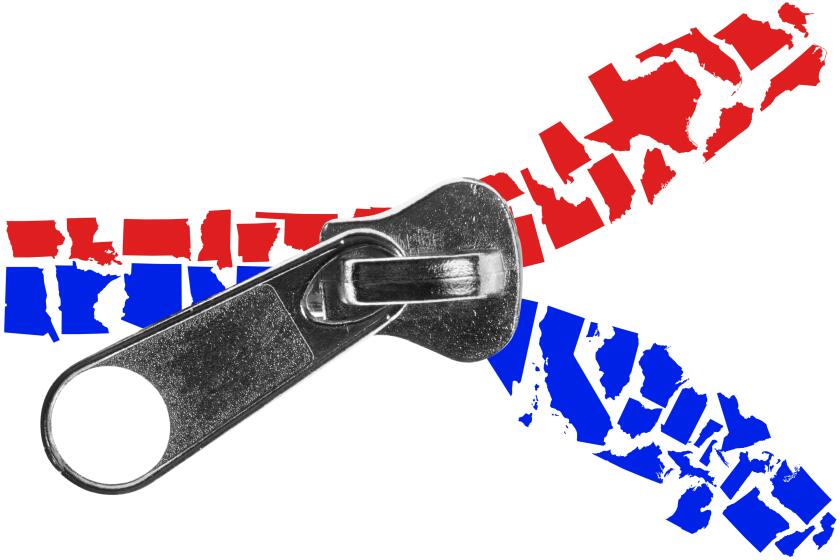News Analysis: Does announcing for president on Twitter prove Ron DeSantis is too online?

- Share via
WASHINGTON — Florida Gov. Ron DeSantis’ presidential announcement on Wednesday — a glitchy live broadcast on Twitter — was the latest example of the Republican candidate’s all-out effort to court his party’s most online activists.
The governor loves to latch onto online conservatives’ obsessions, niche or otherwise.
Wednesday’s announcement, like his speeches, was laden with attacks on acronyms such as ESG, DEI and CRT, which only the most plugged-in partisans can quickly identify as Environmental, Social and Governance and Diversity, Equity and Inclusion goals for companies and organizations and critical race theory, an academic framework taught on some university campuses.
Most high school students don’t take even one Advanced Placement exam, but DeSantis picked a fight this year with the College Board over its AP African American history curriculum. And although almost every Floridian owns an electric stove, DeSantis proposed a tax break recently on gas appliances — after conservative media figures expressed outrage over some liberal jurisdictions’ efforts to ban new gas hookups.
These appeals to the GOP base have helped DeSantis build a brand and may yet win him the nomination, if he can overcome former President Trump’s current hold on the party.
Ron DeSantis made his name on culture war issues. But the new presidential candidate’s healthcare record includes running one of the least-insured states in America.
But relying on the support of the extremely online is also a risk.
Wednesday’s announcement proved the main obstacle: When the technology fails, the candidate can look ill-prepared and like he’s trying too hard. The broadcast got off to a rocky start when the website appeared to crash several times and the hosts, Twitter owner Elon Musk and tech investor David Sacks, could be heard discussing the bandwidth problems and deliberating how to proceed.
By the time it got rolling about 20 minutes late, several of the handpicked activists on the Twitter broadcast spent time praising Musk for restoring their online access after he took ownership of the platform, which had previously pulled some conservative accounts for violating its policies on spreading misinformation or hate speech. They asked DeSantis about pet issues such as Bitcoin and “Dogecoin” regulations, and drew him into a long discourse about breaking up college “accreditation cartels.”
Most Americans aren’t on Twitter, and previous presidential candidates best known for their appeal to their parties’ online bases have fallen short of the nomination. Most Republican voters tell pollsters their top concerns are the economy and immigration, not gas stoves, corporate social responsibility or cryptocurrency named for a rare dog breed.
DeSantis’ political messaging “hews very closely to the concerns of conservative social media users and podcast hosts,” said Tim Miller, a former Republican operative who worked on Jeb Bush’s 2016 campaign before leaving the party in 2020.
“These are usually college-educated men that are upset about what is happening in the culture — gender norms, etc. ... They have a specific point of view. It’s not like there’s none of them. There’s enough of them to support a successful podcast,” added Miller. But “it’s a different set of concerns than rank-and-file voters. It’s cloistered. It’s niche. It’s a bubble of its own kind.”
President Biden’s allies argued that he benefited from a similar strategic divide in 2020, when his top Democratic rivals, Sens. Elizabeth Warren and Bernie Sanders, catered to the party’s online base of white liberals while losing touch with Black and Latino voters who fueled Biden’s victory in Democratic primaries. “Ron DeSantis has an Elizabeth Warren Problem,” Miller warned recently in an article for the Bulwark, an online anti-Trump conservative publication.
Just under a quarter of social media users post about political or social issues, according to a 2022 Pew poll. Those who engage in online politics tend to be at the extreme ends of both parties, with 26% calling themselves conservative Republicans and 29% identifying as liberal Democrats, according to the poll.
Though they are a narrow slice, they tend to be active and passionate about the issues, showing up for candidates as volunteers and donating small sums of money online in big numbers.
Democrats who used Twitter were far more liberal and more likely to support Warren and Sanders, according to a 2020 Pew poll, which also found they were less likely to support “finding common ground with Republicans, even if it means giving up some things Democrats want.”
The governors of California and Florida — two of the nation’s biggest ideological rival states — are leading in opposite directions. Both may run for president.
Warren was so popular with left-wing online activists that she raised millions of dollars for her first Senate campaign in 2012 before most Americans knew who she was. She was mobbed at Netroots Nation conferences, conventions that attract droves of progressive activists.
That energy helped propel her 2020 presidential campaign. But she failed to win over the majority of the party, in part because she felt compelled to adopt the most liberal positions on issues such as universal Medicare to avoid losing ground to Sanders, her fellow left-wing populist.
DeSantis has already had similar struggles, upsetting donors and many mainstream Republicans when he took Trump’s position on Russia’s invasion of Ukraine by calling it a “territorial dispute,” before attempting to modify those comments.
He has also courted his party’s base by signing one of the most restrictive abortion bans in the country and then took the crackdown on trans youth a step beyond other governors by signing a bill to require public school teachers to use the pronouns for the gender students are assigned at birth. His continuing war with Disney over the company’s opposition to his LGBTQ+ policies — which resulted this month in the loss of a $1-billion development and more than 2,000 high-paying jobs in the state — risks alienating business-friendly and libertarian factions of his party.
“To win a nomination, you have to be able to put together energy with grassroots donors and activists, and then you need to grow that coalition over time,” said Dan Geldon, a top aide on Warren’s campaign.
“Right now, DeSantis is pretty untested on both his ability to scale grassroots and his ability to build a broader coalition,” Geldon added.
But like others, Geldon is not counting out DeSantis. Though Trump has a wide lead in polling, many Republicans remain concerned over his attempt to overturn the 2020 election and the fact that he is facing a criminal indictment — with potentially others to come.
“His job is to consolidate the people who voted for Trump twice but are skeptical that Trump can win in 2024 and think he carries too much baggage for a general election,” said Whit Ayres, a Republican pollster.
Divided government in Washington will push even more of the nation’s fiercest political fights to the states.
Trump, in many ways, leans even harder on the online base, often mentioning obscure grievances and stories that travel the internet, verified or not, in his raucous rallies. But he also defined himself to a broader audience through his years of reality television stardom and the perception of his business acumen that began in the 1980s with his book “The Art of the Deal.” And he differentiated himself from the rest of the Republican primary field by vowing not to cut Social Security or Medicare.
DeSantis is still introducing himself to many Republicans. And like others in the field, he is trying to figure out which groups he is courting.
“If there is a way to put together an anti-Trump coalition within the Republican Party — and I think the numbers are there — I don’t know that you’ll do that on Twitter,” said Seth Masket, director of the Center on American Politics at the University of Denver.
Alice Stewart, who worked on five Republican presidential campaigns, believes DeSantis and his campaign recognize the potential problem and are working on broadening his message.
“What he ran on and won on in Florida is more cultural-issues-based,” Stewart said. “But he knows, and the campaign knows, that middle America and general election voters and independent voters want more of a message about leadership, about winning, about the economy, about crime.”
More to Read
Get our L.A. Times Politics newsletter
The latest news, analysis and insights from our politics team.
You may occasionally receive promotional content from the Los Angeles Times.














